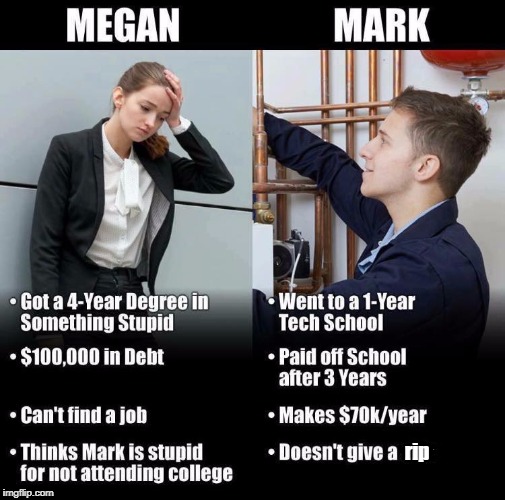Cecilie1200
Diamond Member
That's a good idea but it won't work as long as parents are intent on seeing their kids graduate from college. A college degree carries about the same weight with employers today as a high school diploma did in the mid 20th century.Different strokes for differ folks, a saying that certainly applies to folks making a decision about education.If you went to school to learn a trade, you must be lesser, because someone long ago decided that college should be called “higher” education. Considering the state of colleges and universities today, the word “higher” may be the most misleading of them all.
The way we speak about education is inherently classist. When a student of lesser means attends a traditional four-year school, we say she “overcame her circumstances.” When a student from a wealthy background chooses a trade school we say he didn’t “live up to expectations.” We are all but telling people that the trade jobs this country needs are dirty, and that skills-based education is for people without means or, much worse, without potential.
First off, everyone should complete their high school education, whether you go to public school, private school, home schooled, or get a GED. Many large companies require a high school education for all jobs if you're over 21. Companies like fast food restaurants, retail sales, construction will hire you but they will do a double take when they see you don't have a high school education. The question is why don't. Completion of education always sends a message to employers that you have the ability to commit yourself to a task and finish it. Without a high school education, you're likely to hit a wage ceiling that can be difficult to surpass.
College is not for everyone. It is for everyone who has the ability to complete college without having to attend diploma mills and seek the easiest degrees. According to the US Census Bureau, a college degree is worth a million bucks over a lifetime.
The right kind of trade school, certification program, etc. can be very valuable to both those with and without college degrees. Many college curriculum particular liberal arts are great at teaching you to think, to study, and to analyze. You'll be able to talk to customers, your peers, and your bosses about a variety of subjects even in different languages. Unfortunately, you probably want have the specifics skills your employer is looking for unless you graduated in one of the hot fields in science or technology. Today in many of the vocational trades, employers want some basic job related education before they even take you on as an apprentice.
What high schools need to do is get away from the "Everyone to college" mindset and incorporate trade classes as electives to let kids get a feel for what they are good at, or at least what they want to try to do.
Isn't the problem that a college degree in aboriginal basket weaving holds NO weight with employers outside academia?
My employer looks for Engineering degrees because we are an Engineering firm. However how much does some media company value degrees outside of things like communications or graphic arts?
Depending on the media company, many do like a degree in finance or economics or business if a person is going to be specializing in writing articles about business (for example) or whatever special topic is in question.
I know someone who graduated college with a degree in English and creative writing, and it got him a job in law enforcement because they figured he'd be able to write a coherent report. Go figure.
Last edited:

